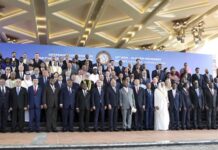While scouring the world for alternatives to Russian natural gas to cope with a possible colder-than-usual winter, the EU is also mulling fresh sanctions against Russia, as EU foreign ministers met on Monday to discuss banning gold purchases from the country.
Chinese analysts said the EU has realized that it has failed to crush Russia even with “maximum” sanctions, thus more sanctions will only become less effective, and the discussions of sanctions were made as the EU faced pressure from the US and some Central and Eastern European countries like Lithuania.
Monday’s discussion was about EU’s seventh round of sanctions. On the question of whether the EU will keep coming up with more rounds of sanctions against Russia, Chinese analysts believe the key lies in whether US President Joe Biden’s Democratic Party wins in Congress in November’s midterm elections.
EU foreign ministers were scheduled to meet to discuss fresh sanctions against Moscow on Monday, and the bloc is considering banning gold purchases from Russia, while more Russian figures could also be placed on the EU blacklist, AFP reported on Monday. The report said Brussels is expected to hold initial discussions on sanctions on Monday, but will not make a decision on the same day.
The EU’s latest move was agreed at a G7 summit last month by EU members France, Germany and Italy with their counterparts from the US, Canada, Japan and the UK.
However, many observers believe the new sanctions will just be symbolic.
“The impact from a ban on Russian gold imports by G7 nations is likely to be fairly limited, given that the industry already took steps to restrict Russian gold,” said Warren Patterson, head of commodities strategy at ING Groep NV, a Dutch financial service company, noting that “it looks as though it’s largely symbolic,” according to a Bloomberg report.
Wang Yiwei, director of the Institute of International Affairs at the Renmin University of China, told the Global Times on Monday that some central and eastern European countries like Lithuania have attempted to kidnap the EU in imposing sanctions against Russia. Meanwhile, as the Czech Republic took over the bloc’s six-month Presidency of the Council, it will continue to push the EU to sanction Russia, even though the EU knows the impact of the sanctions is getting weaker and weaker.
Many European countries have been worried that Russia could reduce or even permanently cut off gas supplies to Europe, as they have not figured out a feasible plan for the upcoming tough winter.
European Commission President Ursula von der Leyen was scheduled to visit Baku on Monday to seek more natural gas from Azerbaijan, Al Jazeera reported on Sunday.
Klaus Müller, president of the Federal Network Agency, Germany’s energy regulator, said that Germany does not currently have enough gas stored up to get through the coming winter without Russian supplies and added that a lot is riding on whether the Nord Stream 1 pipeline starts pumping again after maintenance work is completed this week, Politico reported on Sunday.
While the EU is in the grip of a gas shortage and economic downturn, the bloc is also becoming incapable of fulfilling its promises of help to Ukraine.
Bloomberg reported on Friday that EU foreign ministers were set to agree on 500 million euros ($506 million) more in military aid to Ukraine on Monday.
However, the report said that the EU has slowed its aid to Ukraine due to its economic pain, as the EU has so far only managed to agree on an initial tranche that covers one-ninth of the target it promised to provide Ukraine in May.
As for how long the EU will continue its sanctions against Russia, Wang said that the key lies with the US, as many measures require coordination with Washington.
Meanwhile, the EU is becoming increasingly worried about the US and knows it cannot be relied on, Wang said. He noted that the EU will not be highly valued if former US president Donald Trump wins a second term.
Against this backdrop, the EU is seeking cooperation with other major countries including China, and has realized that the solution to many global challenges needs China’s participation, analysts said.
Valdis Dombrovskis, the European commissioner for trade, and Chinese Vice Premier Liu He will co-chair a virtual high-level trade dialogue on Tuesday where a number of global economic challenges will be discussed, including food security and energy prices, supply chains and financial services, the South China Morning Post reported on Sunday.
A professor at China Foreign Affairs University told the Global Times on Monday on condition of anonymity that China is likely to stress that close China-EU cooperation not only benefits both sides, but is also conducive to solving regional or global issues, such as the Ukraine crisis.
On the Ukraine crisis, both China and the EU do not want chaos or war, and want a ceasefire as soon as possible. The two sides also hold common ground on humanitarian aid, observers said.
Chinese State Councilor and Foreign Minister Wang Yi said on Sunday during a phone conversation with Hungarian Foreign Minister Peter Szijjarto that China is not a party directly related to the Ukraine crisis, but China hasn’t sat on the sidelines, and will not add fuel to the flames. China will consistently and firmly promote dialogues and peace talks, Wang noted.
Although NATO, which is manipulated by the US, expressed alarm over China on supply chains last month, the EU and NATO have a lot of different views on supply chain layout, the expert said.
Economic, cultural and social exchanges are the EU’s core as opposed to military elements, and the enhanced economic ties between China and the EU mean that the two sides’ industrial chain can only be strengthened, but not weakened or decoupled, the expert said.
Global times.





